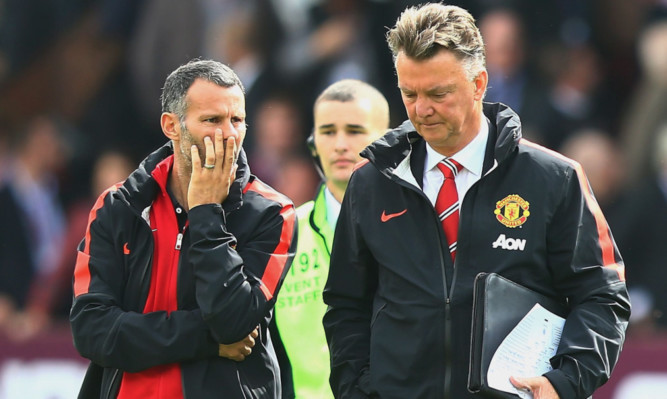
Louis Van Gaal has a mission.
He wants to create a team of players who will be the guardians of Manchester United’s culture for years to come.
The Dutchman takes his side to Leicester today, trying to cash in on the momentum created by an impressive first win of the season against QPR last Sunday.
But while steering United back into the Champions League is the obvious priority this season, Van Gaal is also pursuing a longer-term goal of instilling values into his younger players that will last a lifetime.
“Every youth player coming up is a guardian because he learns the culture from the age of a child,” says the Dutchman.
“The class of 92 were guardians of the culture of the club. It is very important that a club like
Manchester United have guardians and therefore you need a very good youth education.
“Wayne Rooney is captain now, and he is also guardian of this club. He can transfer this culture to his fellow players. You must always have more players who can do that. I have done this with Barcelona and Bayern and it is very important.
“Maybe you know that at Barca I gave a debut to Xavi, Iniesta, Puyol and Valdes. I can mention Badstuber, Muller and Alaba at Bayern. I want to do that here, but the youth player has to take their chance.
“It is no problem for me to play a youth player ahead of someone who cost a lot of money because money doesn’t say anything. Quality says everything. Youth players, when they are talented, give a lot of stimulation to a group.
“I think you have to refresh the squad every year, and I have done it with all my clubs. You can be too long at a club. You always need the hunger to play in the first team.”
Nigel Pearson’s Leicester would not have been a club that figured highly on Van Gaal’s radar in past years.
But he’s adamant that there are no gaps in his knowledge going into the game today.
“I have analysed them three times,” he says. “I have four books about the games they have played already and the game they have lost to a minor club (Shrewsbury in the Capital One Cup).
“I prepare all my matches very thoroughly. I know everything about the team, about individual players, about the substitutes. I know what the atmosphere will be in the stadium, how they will take the free kicks, everything.
“I have my analyst, Marcel Bout, who goes to the games. He gives his analysis to Ryan Giggs and he gives a presentation to me. I check it and he presents it to the players. Then we evaluate our training sessions in which we simulate our opponents.
“In the beginning there was a problem giving too much information to the players. I am training my players in the brain, and that’s why it is so difficult. I give a lot of information and they have to use that information and apply it.”
Meanwhile Leicester City will today be aiming for their first home win in the top flight since May, 2004 when they beat Portsmouth 3-1.
Despite their impressive start, manager Nigel Pearson knows the team’s expectations during games may change.
He said: “It is about getting your preparation right and picking the right side due to tactics, form and a number of criteria. We were dominant last year but we can’t expect to be as dominant this season. We have to be flexible.”

Enjoy the convenience of having The Sunday Post delivered as a digital ePaper straight to your smartphone, tablet or computer.
Subscribe for only £5.49 a month and enjoy all the benefits of the printed paper as a digital replica.
Subscribe